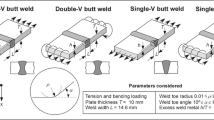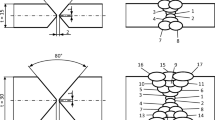Abstract
The recently introduced Engineering Treatment Model (ETM) relates the crack tip opening displacement (CTOD) to the applied load or strain for work hardening materials. The formalisms of ETM were applied to a transverse welded wide plate with a crack in the weld metal. Both the base material and the weld metal were regarded as power law hardening materials. It can be shown that differences in the plastic properties of the weld metal and base material, respectively, significantly affect the CTOD. Quantitative relations are given for the CTOD of a crack in the weld metal normalised by the CTOD a crack in the base material would exhibit. An important result is that the characterisation of a non-matching weld metal by the matching factor M only is not sufficient since work hardening plays an important role.
From this, requirements for minimum weld metal toughness can be established in order to make the toughness performance of the weldment no worse than that of the base material.
Similar content being viewed by others
References
R.M. Denys, in The Fracture Mechanics of Welds, J.G. Blauel and K.-H. Schwalbe (eds.) Mechanical Engineering Publications, Bury St. Edmunds (1987).
British Standards Institution, PD 6493:1980, Guidance on some methods for the derivation of acceptance levels for defects in fusion welded joints (1980).
M. Koçak, J. Knaack and K.-H. Schwalbe in Proceedings 9th International Conference of Offshore Mechanics and Arctic Engineering, M.M. Salama, H.C. Rhee, J.C. Williams and S. Liu, (eds.), The American Society of Mechanical Engineers (1990) 453–459 (GKSS 90/E/23).
R. Denys, Provisional definitive statement on the significance of over and undermatched weld metal strength, IIW Document X-1222–91 (1991).
B. Lian, R.M. Denys and L. van de Walle, An experimental assessment of the effect of weld metal yield strength overmatching in pipeline girth welds, presented at the 3rd. International Conference Welding and Performance of Pipelines, 18th–20th November 1986, London, UK.
D.T. Read and B.I. Petrovski, Elastic-plastic fracture at surface flaws in HSLA weldments, presented at the Fourth International Fracture Mechanics Summer School, Dubrovnik, 23rd–27th June 1986.
K. Saton, M. Toyoda, F. Minami, M. Nakanishi, K. Arimochi and S. Satoh, Transactions Japanese Welding Society 16 (1985) 74–81.
K. Arimochi, M. Nakanishi, M. Toyoda and K. Satoh, Local CTOD criterion applied to fracture evaluation of weldments, Proceedings of the Japanese-German Seminar (1985).
K.-H. Schwalbe, A simple engineering treatment of center cracked tension panels in the regime of non-linear fracture mechanics under plane stress conditions, report GKSS 84/E/38, GKSS Forschungszentrum Geesthacht, D-2054 Geesthacht, 1984.
K.-H. Schwalbe, in The Crack Tip Opening Displacement in Elastic-Plastic Fracture Mechanics, Proceedings of the Workshop on the CTOD Methodology, K.-H. Schwalbe, (ed.), Geesthacht, 23–25 April 1985, Springer-Verlag, Berlin-Heidelberg (1986).
K.-H. Schwalbe. Fatigue and Fracture of Engineering Materials and Structures 14 (1991) 405–412.
Author information
Authors and Affiliations
Rights and permissions
About this article
Cite this article
Schwalbe, KH. Effect of weld metal mis-match on toughness requirements: Some simple analytical considerations using the Engineering Treatment Model (ETM). Int J Fract 56, 257–277 (1992). https://doi.org/10.1007/BF00012330
Received:
Accepted:
Issue Date:
DOI: https://doi.org/10.1007/BF00012330




